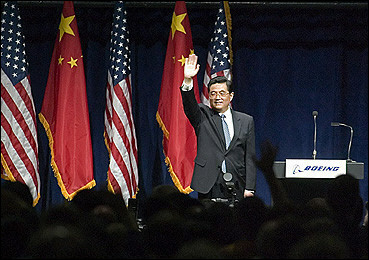Chinese President Hu Jintao urged the United States not to let trade disputes
damage Sino-US relations, arguing that the China trade has saved American
consumers billions of dollars and created millions of jobs.

Chinese President Hu Jintao waves
after addressing Boeing employees during his tour of the Boeing's
Commerical Airplane plant in Everett, Washington. Jintao urged the United
States not to let trade disputes damage Sino-US relations, arguing that
the China trade has saved American consumers billions of dollars and
created millions of jobs. [AFP] |
"Given the
rapid growth, sheer size and wide scope of our business ties, it is hardly
avoidable that some problems have occurred," Hu told a luncheon attended by
about 600 business leaders, government officials and others in the Greater
Seattle area.
"We should properly address these problems through consultation and dialogue
on an equal footing as we work to expand our business ties."
China-US trade has brought "great benefits" to both sides, Hu said on the
second day of his first official US visit and on the eve of a summit with US
President George W. Bush.
The visit comes amid brewing trade disputes between the two countries. Hu is
expected to receive an inquiry from Bush on issues such as China's
undervalued currency, insufficient market opening and piracy.
"According to (US investment bank) Morgan Stanley, in 2004 alone, quality yet
inexpensive Chinese goods saved US consumers 100 billion US dollars and trading
with China created over four million jobs in the United States," Hu said.
US companies doing business with China also have made profits, he added.
Hu insisted China was working hard to reduce its record 202 billion dollar
trade surplus with the United States, but also said it was a natural outcome of
changes in US industry and of globalization.
"At least 90 percent of US imports from China are goods that are no longer
produced in the United States," Hu said.
"Even if not from China, the United States will still have to import these
products from other suppliers."
He said China has been "increasing imports" from the US and has "worked hard"
to reduce the bilateral trade surplus, citing China's import of 6.7 billion
dollars' worth of US soybeans and other farm products as well as orders for 60
Boeing 787 Dreamliner aircraft last year.
On the currency, Hu said China wants a flexible but stable currency exchange
rate and will continue to improve its flexibility.
"Our goal is to maintain the renminbi exchange rate basically stable, at an
adaptive and equilibrium level," Hu said, adding that was to the world's
benefit.
Since July last year when China ended a decade-long peg of the yuan to the
dollar, linking it to a basket of currencies, the yuan has only appreciated by a
little over 3 percent.
Washington believes the Chinese currency remains undervalued by as much as 40
percent, giving Chinese exporters an unfair advantage and fostering deep
imbalances in global trade.
Hu listed a series of steps China is taking to improve its economy and
further open its market to US and other foreign companies, including welcoming
more small and medium-sized American firms to explore business opportunities in
China and encouraging Chinese firms to invest in the US market.
Hu also pledged to increase protection of intellectual property rights,
saying China will "step up law enforcement and crack down hard on IPR
infringement."
Widespread piracy of US products in China, including computer software,
movies, music and pharmaceuticals, has prompted demands by the Bush
administration for China to strengthen copyright protection.
The Chinese president's choice of Washington state as his first US stop,
where he visited with executives of Boeing and software giant Microsoft, appears
to be aimed at easing US concerns about its massive trade deficit with China.
Prior to his speech, Hu made a shorter speech to employees of Boeing
following a tour of a Boeing manufacturing plant, in which he dangled the
lucrative contracts the aircraft maker can sign with the rapidly growing Chinese
aviation market.
A Boeing employee presented Hu with a blue company cap, and Hu did something
rare for the president known for his reserved, cautious style: he hugged the
employee.
Hu left Washington Wednesday afternoon for Washington.